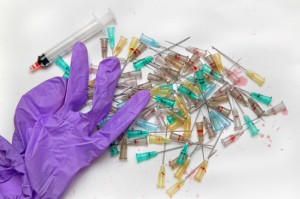OPERATIONS UPDATE: 1/27/26 BWS, Inc. is back to full operations. Please contact us with any questions or concerns about your scheduled pick up - (410) 437-6590 or customercare@bwaste.com
3 Tips for Reducing Medical Waste

Do you know how much medical waste your facility produces? At BWS, we look at these numbers every day. When it comes to Maryland medical waste services, we have clients whose waste output is in pounds, as well as those who produce waste in tonnes. As you already know, medical waste is a big responsibility, both in a legal and financial sense. While you can't avoid it altogether, there might be a few things your facility could do to reduce the amount of medical waste you produce.
Check if All Waste is Medical
Do you have red bio-hazard containers sitting in your hospital's hallways? Have you ever checked what's inside? Your personnel should know what they are for, but your visitors might not think twice about throwing an empty soda can into a container marked “bio hazard.” Green, blue, red—recycling comes in many colors, right? This misuse of designated containers could be generating extra “medical” waste that shouldn't be there. And it's not like you could sort the contents before you hand the container over to your medical waste removal company. Once it's in, it's in. What you can do to fix this:
- Consider placing medical waste containers where your patients and other facility visitors can't use them. Only personnel should have access to these bins to make sure only medical waste goes in.
- Always have a regular waste bin next to a bio hazard container, so that there is less temptation for misuse.
- Make sure that regular waste bins are emptied as they fill up to avoid leaving a bio hazard container as the only trash receptacle available.
- Introduce clear signage on and above the red containers, in multiple languages if necessary.
- Select appropriate size of containers for each room depending on the typical amount of waste generated. The size restriction will make your clinicians more selective about what goes in.
Check if all Medical Waste is Regulated
While you are required to properly dispose of medical waste through a qualified vendor like BWS, this is only true for regulated medical waste. Not all medical waste produced by your facility is regulated. A piece of waste becomes regulated when it contains blood or other bodily fluids that can potentially spread bloodborne pathogens. Regulated medical waste (RMW) includes such things as:
- A blood-soaked gauze
- Organs, tissues, body parts and blood products
- Contaminated sharps (needles, scalpels, etc.)
- Waste from quarantined patients
- Microbiological waste, such as cultures and specimens
- Animal carcasses, waste or body parts exposed to infectious agents.
Note that urine and feces are generally not considered regulated waste, unless visibly contaminated by blood. In different states, definitions of the “regulated medical waste” may vary. Medical waste is typically regulated on a state level and may fall under jurisdiction of several different municipalities. For example, in Maryland it's regulated by both the Department of Health and Mental Hygiene and the Department of Environment. Check with your local laws to determine what your state considers regulated medical waste. Generally, waste from regular patient visits, such as bed liners, device packaging, test strips or medication containers don't fall into the regulated category. By teaching your staff how to identify regulated medical waste, you can greatly reduce your waste output. You can also remove medical waste containers from areas where regulated waste is unlikely, such as patient exam rooms. This way your nurses won't be tempted to use them for unrelated items.
Reuse Items
Certain types of medical waste , although labeled as single-use, can be disinfected and reused. Check with your local regulations to clarify which items are allowed to be reused. Something as simple as reusing your sharps containers can make your red bag a few pounds lighter. And besides reducing the amount of medical waste, you are also saving by not having to purchase replacements. Just these three simple tips can help you significantly cut down the amount of medical waste generated by your facility. Segregation of medical waste and proper container placement will make a big difference in the overall success of your waste reduction initiative. However, after all is said and done, it's up to your employees to either support or compromise your efforts. That's why proper training of both current staff and new hires can't be underestimated. Meanwhile, whether you are a small quantity generator or a large quantity generator, BWS can safely dispose of your medical waste while following all applicable rules and regulations. Contact us for medical waste management services in Maryland, Delaware, Virginia, West Virginia, Pennsylvania, and Washington, D.C.
Ready to get started?
We offer a variety of competitively priced service options with no contracts or hidden fees. Request a free quote.
Our Dedication to Providing the Highest Quality Regulated Waste Services
is Shown in What Our Clients Say About Our Work
We provide an outstanding value and service to our regulated waste customers and pride ourselves over the last 50 years on our 100% customer satisfaction with 99% customer retention ratio.
Paul R Miller, D.D.S. and Team
ZytoGen Patient Services
Akbar Masood, D.D.S.
Chris Donaldson
Dharani Jasthi
Tomicka Jackson-George, D.M.D.
Louis Sachs, D.D.S.
Kate Blair English
Dave Ryan
Kerry Owens, Avalon Plastic Surgery
Jamie Fleming, National Spine & Pain Centers
Keith Roberts, Biomatrix Specialty Pharmacy
Mireia Pedragosa Marin, Synergy Research
Rebecca Crouse, Randolph Macon Academy
Melissa C, Patriot Chiropractic
Dr. Rosario Ignacio
Dr. Thomas Lutz, Odenton Family Dentistry
Dr. Louis Sachs, DDS
Eric B.
Brenda Shah
Stay connected - Be the first to know!
Get BWS news and promotions straight to your inbox
Don't worry. We won't sell your information!




